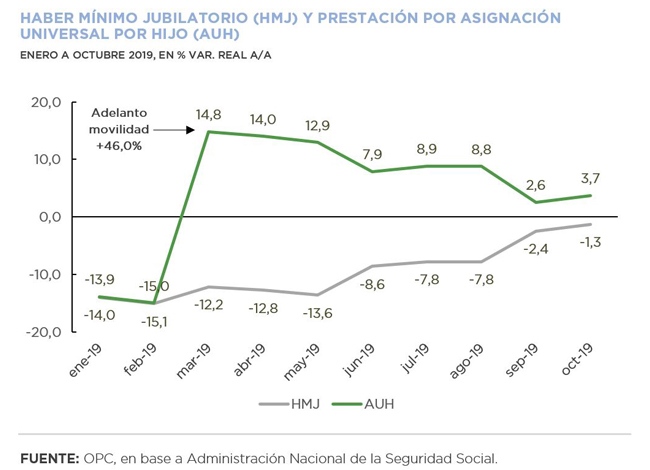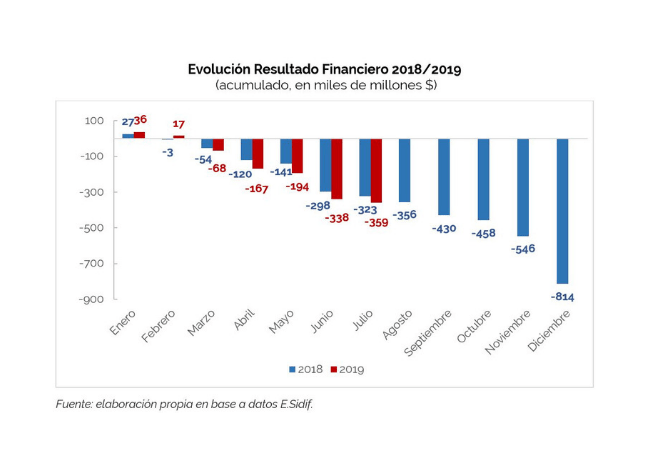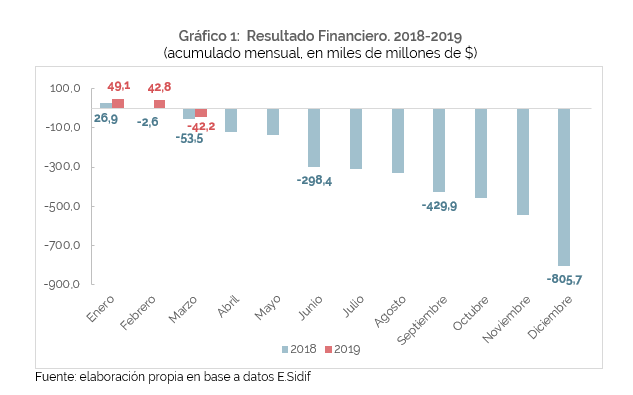
by Nicolas Perez | Nov 12, 2019 | Budget Execution
October’s primary balance was in surplus by AR$23.09 billion, improving previous year’s performance. However, considering the payment of interest on the public debt for AR$39.48 billion, the financial balance was in deficit by AR$16.38 billion.
So far this year, that negative balance amounts to AR$340.55 billion and implies an improvement of 51.6% YoY in real terms compared to the same period of 2018.
To a large extent, this is possible because in the first ten months resources grew at a rate of 57.1% YoY (2.1% YoY real) with respect to 2018, 15.3 percentage points above total expenditures, which grew by 41.9% YoY (-7.8% YoY real).
The item with the highest year-on-year expansion was family allowances, which grew by 26.1% in real terms, mainly due to the increase in the Universal Child Allowance.
National government salaries grew nominally 38.4% YoY, however, they contracted 8.9% YoY in relation to inflation.
In 2019, property income increased its share in total resources, basically due to the resumption of Treasury financing through the transfer of Central Bank profits and the decline in the level of economic activity and the formal labor market as of April 2018, with an impact on tax resources.

by Nicolas Perez | Aug 8, 2019 | Budget Execution
A surplus of AR$43.42 billion was recorded in July, a considerable improvement over the previous year’s figure (-AR$1.9 billion). The financial balance is negative by AR$21.04 billion but implies a drop of 44.4% in real terms in the year-on-year comparison. Transfers to provinces showed a monthly year-on-year drop for the first time this year.
- The increase in resources slowed down in July, although they grew again above expenditures (55.9% vs. 49.0%).
- Tax revenues (58.8%) led total revenue growth, while debt interest (186.4%) and capital expenditures (152.9%) were the fastest growing components of public expenditure.
- In the first seven months of the year, the financial balance was negative by AR$359.1 billion, an increase of 11.2% with respect to the same period of the previous year. In real terms, this represents a reduction of 27.9%.
- During the first seven months of the year, 57.0% of total expenditure was accrued, identical to the level recorded in the same period a year ago.
- From the beginning of the fiscal year to the end of July, the initial budget was increased by AR$88.3 billion, that is, 2.1%. The 39.2% of the amendments were implemented through the Necessity and Urgency Decree 193, while the remaining 60.8% were implemented through four Administrative Decisions.

by Nicolas Perez | Apr 11, 2019 | Budget Execution
In a context of economic downturn, in March the national government had a better performance compared to the same month of the previous year, but liquefied the surplus recorded in the first two months of the year.
-
The National Government recorded in the first quarter a financial deficit of AR$42.19 billion, which implies a real drop of 47.9% compared to the same period of 2018.
-
Total revenues increased 39.4% YoY, and expenditures increased 34.0% YoY.
-
Export duties increased by 477.0.% YoY, becoming the most dynamic source of resources in the period.
-
Interest payments on public debt rose 65.1% YoY and economic subsidies doubled (107% YoY).
-
Capital expenditure remains at the same levels as a year ago, which means a fall in real terms of 33.7% YoY.
-
As of March 31, the initial budget appropriation was increased by AR$40.32 billion, AR$34.57 billion by Necessity and Urgency Decrees – DNU (86%) and AR$5.73 billion by Administrative Decisions – DA (14%).
-
The level of total expenditure implementation in the quarter was 19.1%.



